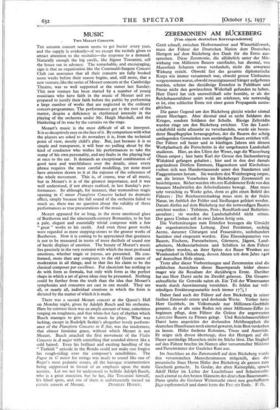MUSIC
Two Mozart Concerts THE autumn concert season seems to get busier every year, and the supply is evidently—if we except the recitals given to attract attention to the recitalist—the response to a demand. Naturally enough the big swells, like Signor Toscanini, sell the house out in advance. The remarkable, and encouraging, sign is that an organisation like the Courtauld-Sargent Concert Club can announce that all their concerts are fully booked some weeks before their season begins, and, still more, that a new venture, like the series of Mozart concerts at the Cambridge Theatre, was so well supported at the outset last Sunday. This new venture has been started by a number of young musicians who have faith in the music of Mozart and are prepared to justify their faith before the public by performing a large number of works that are neglected in the ordinary concert-programmes. The performances got to the root of the matter, despite a deficiency in rhythmical intensity in the playing of the orchestra under Mr. Haigh Marshall, and the blanketing of its tone by the curtains on the stage.
Mozart's music is the most difficult of all to interpret. It is so deceptively easy on the face of it. By comparison with what the players are asked to do nowadays it is, - from the technical point of view, mostly child's play. But, just because it is so simple and transparent, it will bear no pulling about by the kind of conductor who wishes his performances to take the stamp of his own personality, and any faults in the playing leap at once to the ear. It demands an exceptional combination of good taste and watchfulness over the - details, since every, phrase requires the most careful modelling, yet none must have attention drawn to it at the expense of the coherence of the whole movement. This is, of course, true of all music, but in Mozart's it is of the greatest importance, and it was well understood, if not always realised, in last Sunday's per- formances. So although, for instance, that tremendous-tragic opening in C minor Pianoforte Concerto lacked its dramatic effect, simply because the full sound of the orchestra failed to reach us, there was no question about the validity of these performances as true presentations of the music.
Mozart appeared for so long, in the more emotional glare of Beethoven and the nineteenth-century Romantics; to be but a pale, elegant and essentially trivial composer With a few " great " works to his credit. And even those great works were regarded as mere stepping-stones to the greater works of Beethoven. Now it is coming to be appreciated that greatness is not to be measured in terms of mere decibels of sound nor of hectic displays of emotion. The beauty of Mozart's music lies precisely in the very restraint with which the most profound emotions, whether tragic or joyous, are presented. He con- formed, more than any composer, to the old Greek canon of moderation in all things, and in that lies his claim to be the classical composer par excellence. For classicism has nothing to do with form as formula, but only with form as the perfect shape in which a set of given ideas may be presented. Nothing could be further from the truth than the idea that Mozart's symphonies and concertos are cast in one mould. They are all, or nearly all, individual creations in which the form is dictated by the matter of which it is made.
There was a second Mozart concert at the Queen's Hall on Monday night, given by- Adolph ,BUsch and hi a orchestra. Here by contrast there was an ample amount of tone, sometimes verging on roughness, and that white-hot fury of rhythm which Busch manages to give to the music he plays.- What was lacking, except in Rudolph Serkin's altogether lovely perform- ance of the Pianoforte Concerto in 'E flat, was the tenderness, that almost feminine grace, without which Mozart is not Mozart. Busch attacked the first movement of the• Violin Concerto in A major with something that sounded almost like a cold hatred. Even his brilliant and exciting handling of the " Turkish " episode in the Rondo could not make one forgive his rough-riding over the composer's sensibilities. The Fugue in C minor for strings was made to sound like one of Reger's most pedantic essays, all the baroque ornamentation being suppressed in favour of an emphasis upon the main accents. Let me not be understood to belittle Adolph Busch, who is a great musician, but he has, like Toscanini himself, his blind spots, and one of -them is unfortunately turned on






















































 Previous page
Previous page